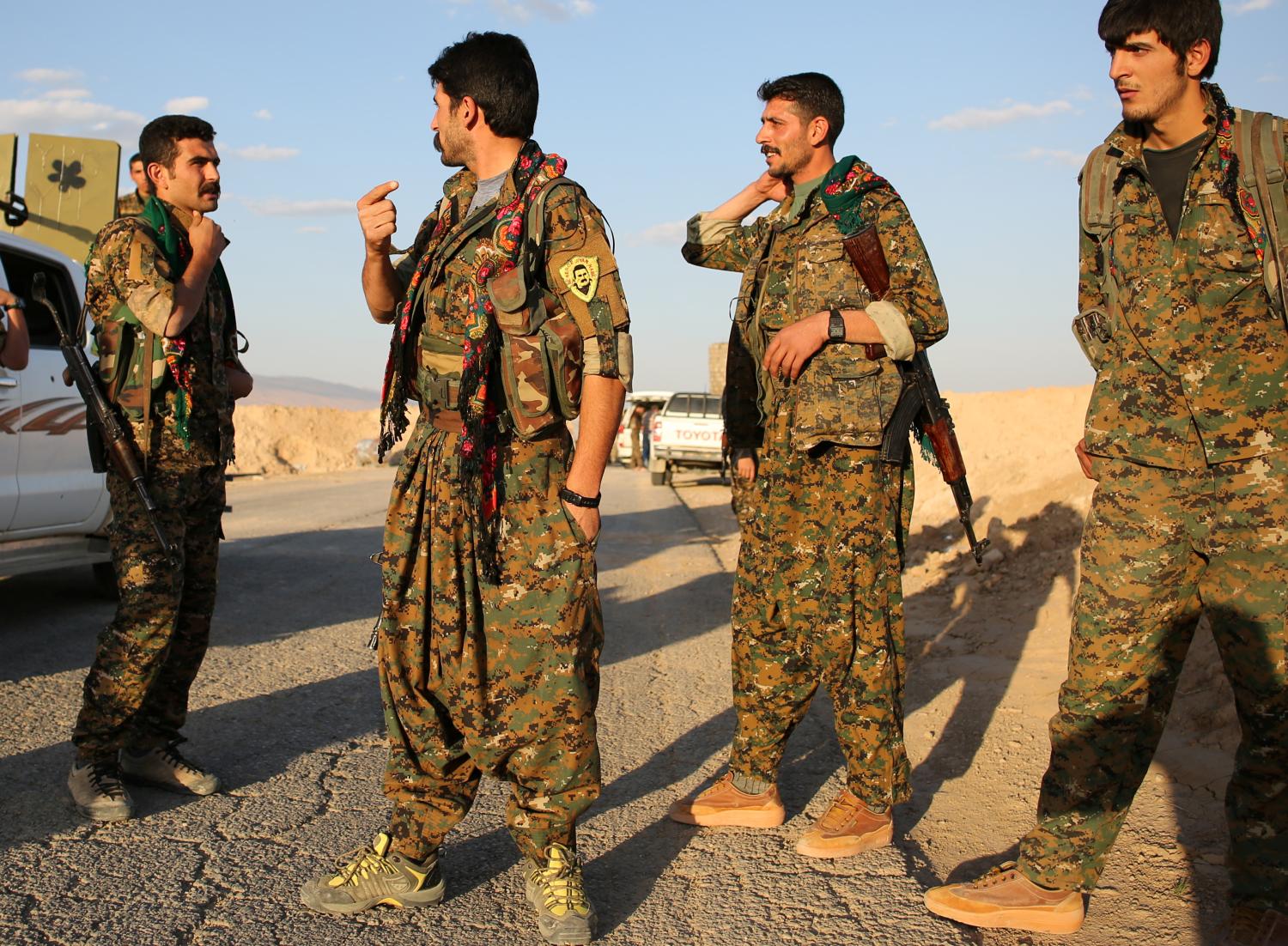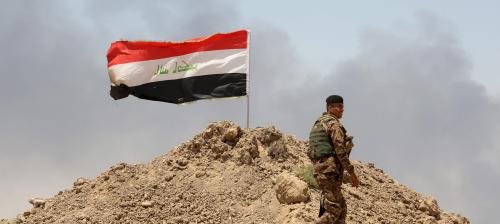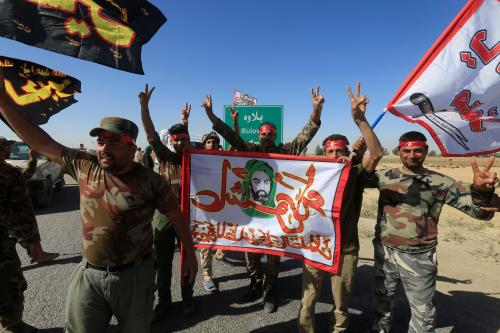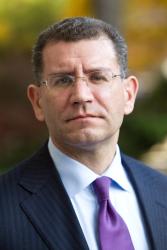I spent last week in Irbil, Iraq along with Michael Knights of the Washington Institute for Near East Policy. We met with a wide range of senior Iraqi and Kurdish officials, as well as journalists, analysts, and academics. The trip included a visit to Kirkuk after the terrorist attack there on October 21 as well as time spent near the frontlines, observing Peshmerga military operations against the Islamic State (also known by its Arabic acronym, Da’esh) and discussing the campaign with U.S. and Kurdish military officers.
This post describes my impression of events in the Kurdistan Regional Government (KRG) of Iraq. A prior post described my sense of developments in the liberation of Mosul and Iraqi politics more generally.
The view of Mosul from Irbil
Across the board, the Kurds appear generally pleased with the military aspects of the Mosul offensive.
One area of the military campaign that many Kurds point to as a pleasant surprise has been the cooperation they have been receiving from the Iraqi Security Forces (ISF) and the U.S.-led coalition. This despite the complete absence of American air support for the Peshmerga on October 20, and the failure of the ISF to attack on October 23. Any number of Kurdish leaders, including some of the highest in the land, talked about how after 55 years (or more) of intermittent combat between the Iraqi Army and the Peshmerga, the two forces were getting on extremely well. Not only were they working well together, but soldiers and officers on both sides showed respect toward one another and an easy camaraderie that bemused—and encouraged—their leaders.
Meanwhile, the Kurds indicated a consensus that they had no desire to go into Mosul itself. That sentiment held among many senior Kurdish Democratic Party (KDP) personnel as well, who have the most to gain from taking the Kurdish sections of Mosul, which are pro-KDP and therefore potentially important voters.
Almost across the board, Kurdish leaders evinced a philosophical wait-and-see attitude to post-liberation Mosul. They adamantly believed it was a mistake not to have had an agreed-upon plan among all of the potential participants, and they fear that the Iraqi government will not be up to the challenge of handling it itself. However, they showed no inclination to get involved. Indeed, several very senior Kurdish leaders stated matter-of-factly that if the stabilization of Mosul fails and there is widespread fighting, they plan to do no more than defend their own lines, bring in refugees and leave the mess to the Iraqis and Americans to clean up. We heard no apocalyptic threats that widespread fighting in Mosul would inevitably trigger Kurdish intervention, which was noteworthy.
To the extent that the Kurds are concerned about the military campaign to defeat Da’esh, their fears dwell on events farther west, at Sinjar and Tal Afar. In both places, minority populations—Yazidis and Turkmen respectively—create sources of potential conflict. The Yazidis of Sinjar are caught between the Kurdistan Workers’ Party, or PKK (and behind them, the Patriotic Union, or PUK, and Iran) on one side, and the KDP and Turkey on the other. For their part, the Turkmen of Tal Afar are divided between Sunnis who furnished many recruits and top leaders for Da’esh but are also “protected” by Turkey, and Shiites who were badly oppressed by the Sunnis and Da’esh. Not surprisingly, the Shiite Hashd ash-Shaabi (Popular Mobilization Forces) have vowed to liberate their Shiite (Turkmen) brethren and punish the Sunnis for their embrace of Da’esh. The Kurds, particularly the Turkish-aligned KDP, echo Ankara’s warnings that a PKK move on Sinjar or a Hashd ash-Shaabi move on Tal Afar could unleash a Turkish invasion. That, in turn, could draw in KDP intervention on the Turkish side, and PUK intervention on the PKK-Iranian side. That would be disastrous, and even if the PUK and KDP avoided open combat, it would further poison their strained relations.
Persistent political stalemate
In part because of the uncertainty surrounding future developments at Sinjar and Tal Afar—and in part because the KRG has little bandwidth beyond that which is focused on Mosul—the domestic political scene remains frozen in Irbil. Of course, there are other reasons as well. The PUK remains locked in the ongoing battle for control of the party between the Talabani family and a group of challengers centered around KRG Vice President Khosrat Rasul Ali and former KRG Prime Minister Barham Salih. Meanwhile, the Gorran party—the second largest in the KRG parliament—is itself paralyzed by its mishandling of the 2015 protest moves against the KDP and the fact that its own outsized leader, Nawshirwan Mustafa, has been on extended medical leave abroad for chemotherapy. Most Kurds believe that Nawshirwan’s condition is terminal and Gorran seems in disarray, unable to do anything in his absence and unable to pick a new leader, even a temporary one.
There is a growing recognition across the Kurdish leadership that the current deadlock is an embarrassment and a failure on all of their parts. Unfortunately, both the PUK and Gorran seem too preoccupied with their own internal crises to do anything about it. Because governance lies primarily with the KDP at present, they are the ones most caught up in the Mosul fight and can afford to concentrate on it by arguing (not necessarily incorrectly) that neither Gorran nor the PUK is unified enough to hold meaningful negotiations. Still, senior KDP leaders claim that they plan to make dramatic—and constructive—moves after the liberation of Mosul to try to form a new government and get things moving again. Surprisingly, they are also adamant that there will be new elections in 2017. These could help or hurt depending both on the distribution of seats in the parliament and the ability of the PUK and Gorran to respond positively to any serious KDP effort to overcome their differences, assuming that there is one.

Progress toward independence…
Two factors that appear to be major contributors to the strangely positive feel to Irbil despite the problems swirling around it, are the progress the Kurds feel they have made on both independence and internal reform. In the past month, senior Kurdish officials including KRG President Mas’ud Barzani and Prime Minister Nechirvan Barzani have had what they characterize as positive and constructive conversations with Shiite political leaders in Baghdad, including Prime Minister Abadi, regarding Kurdish independence. They say that Abadi and other moderate Shiite leaders were receptive to the KRG’s desire for independence—or at least full sovereignty within a confederal structure. The two sides have agreed to establish a joint committee to discuss a peaceful secession process, which Kurdish moderates have been seeking for years, in part as a way to forestall a precipitous move toward independence by more hardline Kurdish leaders.
Barzani is no fool and understands that Abadi may well be driven by his immediate need for KDP support against Maliki, as I described in my previous post. Nevertheless, the Kurds do believe that Abadi is sincere in his willingness to allow the KRG to secede, and Abadi has expressed this sentiment to many others, including myself as recently as March 2016. Moreover, the Kurds have insisted that a decision to secede cannot be agreed to by Abadi alone; they have demanded that the entire Iraqi National Alliance (the Shiite umbrella group) bless any deal for independence. When pressed about Abadi’s ability to deliver on this critical question, and on the likelihood that the deal would survive if Abadi loses Iraq’s 2018 parliamentary election to former Prime Minister Nuri al-Maliki or Hashd ash-Shaabi leader Hadi al-Ameri, the Kurds acknowledged the risk. However, they also indicated that they believe this to be a reasonable way forward for them, one that they are determined to explore even if it leads nowhere.
Consequently, I found an important shift in Kurdish thinking about independence. The Kurds once believed that the road to independence ran through Ankara, but they now believe it runs through Baghdad. Most Kurdish leaders, at least KDP officials, continue to believe that they can convince Ankara to support an eventual, peaceful secession. However, they acknowledge that Turkish President Recep Tayyip Erdoğan’s new problems with the Turkish and Syrian Kurdish populations—perhaps coupled with his increasingly volatile behavior—has made him a less reliable ally in this matter.
The Kurds once believed that the road to independence ran through Ankara, but they now believe it runs through Baghdad.
As part of their efforts in this area and another sign of tangible progress, the Kurds have been in discussions with the Central Bank of Iraq to open a branch in Irbil. This would finally give the KRG some ability to control local financial circumstances, and possibly pave the way toward a more expansive monetary policy under independence or confederation.
Indeed, another debate that the Kurds only seem to be tentatively approaching is the potential question of independence or confederation? Because discussions with Baghdad are still in their infancy, and much will depend on the KRG’s security and economic circumstances at the time that these negotiations reach maturity (if they ever do), it is impossible to know what the Kurds will decide. Still, the more moderate KRG leaders appear to believe that confederation could represent an acceptable interim status, with the expectation that this would eventually translate into full independence somewhere farther down the road. In particular, they stress that if the KRG can gain full sovereignty, full control of their defense policy (including the right to buy military hardware directly and receive end-user certificates), full control of their energy policy (including the right to sell oil on their own, and so eliminate the discount that they are forced to pay because of the uncertain legality of their current oil exports), and full control over monetary policy (including the right to print money, establish their own central bank, issue public debt and borrow from international financial institutions and other foreign lenders), they will be content with confederation.
…And progress on reform
Meanwhile, Kurdistan’s undervalued reform agenda continues to move along smartly, marking milestones that are quite remarkable in their own right. The KRG has completed a comprehensive external audit of the finance ministry and has engaged a former finance minister of Lebanon (highly-regarded for fighting corruption there) to overhaul the finance ministry in Irbil. The KRG has retained both Ernst & Young and Deloitte, to conduct a massive audit of the entire oil and gas sector—something that will now be done on an annual basis to root out corruption and inefficiency in that critical sector. In the past year, Irbil has reduced subsidies and cut government salaries by 49 percent, all part of an austerity program more severe than any other in recent years. The economist Athanasios Manis has calculated that KRG fiscal consolidation equaled 37 percent of GDP during the past three years. He notes that Greece, whose austerity program has famously pushed the country to the brink of revolution, only implemented a fiscal consolidation of 16.7 percent and that was over five years. Yet there has been no public backlash against these measures except for a strike by policemen who wanted to be classified as security personnel and so exempted from the salary cuts.
The next two programs of KRG reform are aimed at further reducing costs and corruption. The first will target the electricity sector, privatizing distribution, metering (and charging for) consumption, and improving the distribution infrastructure to reduce “leakage” from the age and poor quality of much of the grid. The second will introduce a biometric registration program (including fingerprints and iris scans) for all KRG civil servants, including the Peshmerga. Only those registered in the biometric database will be able to collect paychecks, potentially eliminating tens or even hundreds of thousands of ghost workers and soldiers. This new program will begin in November and should be complete by January. Moreover, Irbil intends to marry the biometric database to an electronic payment system to ensure that salaries are paid automatically and expeditiously, and to further minimize the ability of thieves to collect unearned salaries.
These reforms are remarkable and little appreciated by the Kurdish public, which (understandably) focuses only on their unpaid salaries and the reduction in government services required by the austerity program.
Many Kurds still hope that independence will solve their problems in the short term, by allowing the KRG to borrow money both domestically and internationally, by eliminating the discount on KRG oil exports, and by giving them full control over their monetary policy. The fact that they now feel like there is real hope for a peaceful secession has been a significant psychological boon. However, over time, it is likely that if these far-reaching reforms in economics and governance continue and expand, they will ultimately be the greatest benefit to Kurdistan, potentially setting it on the course to eventual stability, if not real prosperity.
The Brookings Institution is committed to quality, independence, and impact.
We are supported by a diverse array of funders. In line with our values and policies, each Brookings publication represents the sole views of its author(s).









Commentary
Iraqi Kurdistan: Mosul and beyond
November 2, 2016